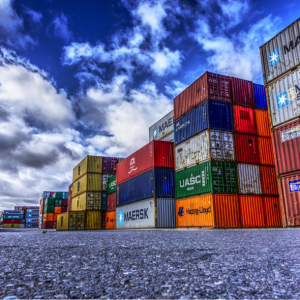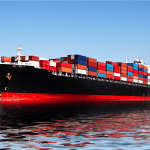Shippers Hit with Coronavirus-Related Detention Fees
 There have been a ton of blank sailings related to COVID-19, commonly referred to as the coronavirus or novel coronavirus. In fact, according to an advisory that Tommy Chan, Compliance Manager of Seamaster Global Forwarding, sent to Universal Cargo, “More than 100 additional blank sailings have been announced due to the extended Lunar New Year holidays and/or COVID- 19.”
There have been a ton of blank sailings related to COVID-19, commonly referred to as the coronavirus or novel coronavirus. In fact, according to an advisory that Tommy Chan, Compliance Manager of Seamaster Global Forwarding, sent to Universal Cargo, “More than 100 additional blank sailings have been announced due to the extended Lunar New Year holidays and/or COVID- 19.”
One of the worries that comes with these blank sailings is a supply shortage, especially in terms of empty shipping containers. Cancelled sailings have gone both ways, in and out of China, causing shippers and truckers in many cases to have trouble returning containers. Thankfully, we haven’t really ended up with a major shipping container shortage, as Seamaster said in its advisory (which is from this week):
Currently, container equipment is sufficient in China, but the availability of Non-Operating Reefers (NOR) is diminishing. The US ports are not experiencing a major shortage, but it is a concern at inland points. Equipment supply is getting tight in Europe, while Germany is facing a shortage. In Asia and Oceania, there is no equipment shortage.
That’s good news, but there is bad news. Coronavirus preventing the return of empty containers results in fees and penalties. Ari Ashe reports in the Journal of Commerce (JOC):
Shippers and truckers are raising the alarm on how blank sailings linked to the coronavirus disease 2019 (COVID-19) will cause a rash of detention penalties between $100 to $200 per day if it remains difficult to return empty containers to terminals in Los Angeles and Long Beach.
While Ocean Network Express (ONE) is waiving detention fees, according to a Feb. 25 advisory from the company, other steamship lines haven’t provided such amnesty, say motor carriers. Container lines may be reluctant to waive such fees, considering the volume slump caused by COVID-19 is costing them $300 to 350 million weekly, according to consultancy Sea-Intelligence Maritime Consulting.
It doesn’t seem fair that shippers and truckers should get strapped with these costs because of something that is completely out of their control. Of course, looking at it from the other angle, it probably isn’t fair that carriers should have to shoulder all of the costs from the coronavirus either.
However, I think there is a difference here. Carriers have been losing revenue (significant revenue) for a time because the COVID-19 outbreak extended the shutdown of the Chinese New Year and stopped much movement of goods in and out of the country that basically serves as the world’s biggest shipping hub. Now, production is ramping back up in China. When production and shipping slows for a time, it is usually followed by an increase to make up for it.
Don’t forget about one of the things we highlighted in our last blog about COVID-19’s effect on shipping — how the JOC’s own Peter Tirschwell pointed out that many think China’s “prolonged [manufacturing] shutdown is just a prelude to an overwhelming surge, and likely capacity shortages, that will materialize once factories are back to full production, fulfilling demand for a still very strong US economy.”
This is not to say that carriers ultimately will carry no losses from the coronavirus, but those losses should be mitigated by increases that follow this period of decrease. When you boil it down, carriers have been going through a time of diminished demand for service, though it comes from a different cause than the usual things like seasonal slumps or economic downturn.
Expensive fines like detention fees, on the other hand, have no mitigation. Those are just losses shippers (and sometimes truckers) suffer beyond the delays they’re already suffering in their supply chains. Being charged a fine when they are not actually doing anything wrong (a fine that carriers may be using to help mitigate their costs to boot) is, well, wrong. Even ONE’s waiving of detention fees does not mean its customers aren’t incurring extra costs in their shipping process. Ashe continues in the JOC article:
There are limits to the leniency carriers will show, however, with ONE saying it won’t reimburse for storage or escalating fees. That resistance is causing trucker and cargo owner frustration about being penalized for factors they argue are beyond their control.
The article goes on to give an idea of just how hard it is for shippers and truckers to get empty containers back to the Ports of Los Angeles/Long Beach, the biggest/busiest ports by capacity in the country:
Some terminals last month began notifying beneficial cargo owners (BCOs) they would only issue appointments to return empty containers if the trucker retrieved a full container, known as a dual transaction. Other terminals began to refuse returns of all empty containers. Several terminal operators told JOC.com that is necessary because of the reduction of outbound vessel capacity needed to return the empties to Asia, and available terminal space is becoming scarce.
Ashe goes on to add 25 day or evening work shifts that have been cancelled because of reduced import volumes during this COVID-19 outbreak. That further reduces opportunity for container return.
This whole thing is tough on shippers incurring fees because they are not getting the extensions that would normally come from port closures due to a natural disaster despite basically facing the same situation of not being able to return containers to the port terminals.




